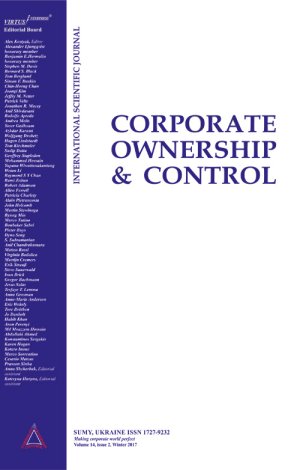
-
 Journal menu
Journal menu

- General information
- Editorial Board and External Reviewers
- Journal Policies
- Publication Ethics and Malpractice Statement
- Instructions for authors
- Paper reviewing
- Article processing charge
- Feedback from stakeholders
- Journal’s Open Access statement
- Order hard copies of the journal
- 50 most cited papers in the journal
CIRCUMSTANCES RELATING TO INTERLOCKING DIRECTORATES IN ITALY: AN EXPLORATORY STUDY
Download This ArticleAbstract
Despite a large body of research in the management, accounting, economics, and finance literatures, the relationship between board composition and firm performance is still controversial and ripe for debate (for a recent study, see Boone et al., 2004). Utilizing the theoretical approach of Zahra and Pearce (1989) that identifies the three key roles of the board as oversight, strategy, and service, we examine the effects of having board interlocks between an industrial firm and of financial services firm, and firm characteristics. Using publicly available data on all listed Italian firms for the year 2001, we find that for industrial firms, there is a positive relationship between the number of board interlocks with a bank and current year return on assets, however, the opposite is true for financial services firms. Finally, we find no relationship between interlocking directorates with banks and firm capital structure.
Keywords: Board of Directors, Corporate Governance, Italy
How to cite this paper: Markarian, G., Parbonetti, A., & Previts, G. J. (2007). Circumstances relating to interlocking directorates in Italy: An exploratory study. Corporate Ownership & Control, 4(2-1), 192-204. https://doi.org/10.22495/cocv4i2c1p4

















